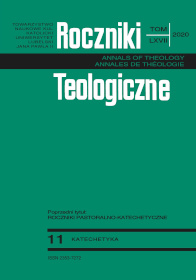ICT in the Formation of Polish Catechists Today
Abstract
With the development of new information and communication technologies in Poland and the digitization of Polish schools, an attempt was made to present ICT as used in the contemporary formation of Polish catechists. Reference was made to the catechetical documents of the universal Church and in Poland, normative acts and literature of the subject. Attention was paid to both initial and permanent formation. For this purpose, a short presentation was made of the current state of the formation of catechists in Poland regarding ICT. Next, the status and functions of ICT in the formation of Polish catechists were analyzed and the ways of its implementation. This showed that ICT has a special place in the contemporary formation of Polish catechists. ICT is indispensable for catechists because only in this way can they enhance their IT skills. At the same time a number of e-learning options were presented, as well as the possibilities that ICT opens for catechists working in schools regarding lesson organization and methodology. Also, the article shows the importance of the ability to use remote learning platforms (e.g., Storybird, Padlet, Story Dice) and create and use various applications (such as LearningApps.org., Kahoot!).
References
Chmielewski, Mirosław. „Nowe media – nowe wyzwania wychowawcze dla katechezy.“ Roczniki Teologiczne 65, Nr. 11 (2018): 127–48.
„ICT – Technologie informacyjno-komunikacyjne.“ istshare. Abgerufen am 30. April 2020. https://www.istshare.eu/ict-technologie-informacyjno-komunikacyjne.html.
„Kilka słów o TIK.“ Tik w szkole602642223 (Blog), 17. März 2018. Abgerufen am 30. April 2020. https://tikwszkole602642223.wordpress.com/2018/03/17/kilka-slow-o-tik.
Kongregation für den Klerus. Dyrektorium ogólne o katechizacji [Allgemeindirektorium über Katechisierung]. Poznań: Pallottinum, 1998.
Korgul, Marek. Dydaktyka dla katechetów. Świdnica: Usługi Poligraficzne Bogdan Kokot vel Kokociński, 2014.
Łabendowicz, Stanisław. Metodyka katechezy. Radom: Instytut Naukowo-Wydawniczy „Spatium“, 2019.
Mąkosa, Paweł. „Nauczanie wobec cyfryzacji polskiej szkoły.“ Roczniki Teologiczne 61, Nr. 11 (2014): 25–38.
Polnische Bischofskonferenz. Dyrektorium katechetyczne Kościoła katolickiego w Polsce [Katechetisches Direktorium der katholischen Kirche in Polen]. Kraków: WAM, 2001.
Porozumienie pomiędzy Konferencją Episkopatu Polski oraz Ministrem Edukacji Narodowej z dnia 3 kwietnia 2019 roku w sprawie kwalifikacji zawodowych wymaganych od nauczycieli religii [Abkommen zwischen der polnischen Bischofskonferenz und dem Ministerium für Nationale Bildung vom 3. April 2019 über die beruflichen Anforderungen an Religionslehrer*innen]. Dziennik Urzędowy MEN [Amtsblatt des Ministeriums für Nationale Bildung] 2019, Pkt. 9.
Rojek, Tomasz. „Aplikacje do tworzenia szkolnych quizów.“ TIK w edukacji, 24. Oktober 2019. Abgerufen am 1. Mai 2020. http://www.tikwedukacji.pl/wydania/pazdziernik-2019/art,2486,aplikacje-do-tworzenia-szkolnych-quizow.html.
Rozporządzenie Ministra Nauki i Szkolnictwa Wyższego z dnia 25 lipca 2019 r. w sprawie standardu kształcenia przygotowującego do wykonywania zawodu nauczyciela [Verordnung des Ministers für Wissenschaft und Hochschulwesen vom 25. Juli 2019 über Ausbildungsstandards für den Lehrerberuf]. Dziennik Ustaw [Gesetzblatt der Republik Polen] 2019, Pkt. 1450.
Rozporządzenie Ministra Edukacji Narodowej z dnia 26 lipca 2018 r. w sprawie uzyskiwania stopni awansu zawodowego przez nauczycieli [Verordnung des Ministers für Nationale Bildung vom 26. Juli 2018 über die Beförderung von Lehrern]. Dziennik Ustaw 2018, Pkt. 1574.
Rozporządzenie Ministra Edukacji Narodowej z dnia 23 sierpnia 2019 r. zmieniająca rozporządzenie w sprawie uzyskiwania stopni awansu zawodowego przez nauczycieli [Verordnung des Ministers für Nationale Bildung vom 23. August 2019 über Änderungen der Verordnung über die Beförderung von Lehrern]. Dziennik Ustaw 2019, Pkt. 1650.
Seweryn, Renata. „Technologie informacyjne i komunikacyjne – wprowadzenie w problematykę.“ In Technologie informacyjne i komunikacyjne na rynku turystycznym, hrsg. v. Jadwiga Berbeka und Krzysztof Borodako, 11–30. Warszawa: C.H. Beck, 2017.
Solecka, Bożena. Nowoczesne technologie w aktywizowaniu ucznia. Konsultacje nauczycieli z SORE w ramach wspomagania szkoły w rozwoju. Warszawa: Ośrodek Rozwoju Edukacji, 2018.
Ustawa z dnia 26 stycznia 1982 roku – Karta nauczyciela [Gesetz vom 26. Januar 1982 – Lehrercharta]. Dziennik Ustaw 2019, Pkt. 2215.
Ustawa z dnia 7 września 1991 roku o systemie oświaty [Gesetz vom 7. September 1991 über das Bildungssystem]. Dziennik Ustaw 2019, Pkt. 1481, 1818, 2197.
Ustawa z dnia 14 grudnia 2019 r. prawo oświatowe [Gesetz vom 14. Dezember 2019 Bildungsrecht]. Dziennik Ustaw 2019, Pkt. 1148, 1078, 1287, 1680, 1681, 1818, 2197, 2248; 2020, Pkt. 374.
Zając, Marian. „Możliwość wykorzystania technologii informacyjno komunikacyjnych w edukacji religijnej“, Biuletyn Edukacji Medialnej, Nr. 2 (2015): 85–96.
Zellma, Anna. „Cyberprzestrzeń w warsztacie pracy edukacyjnej nauczyciela religii – szansa czy zagrożenie?“ Świat i Słowo 22 (2014): 185–96.
Zellma, Anna. „Edukacyjne i społecznościowe portale jako nowe przestrzenie w warsztacie pracy i doskonalenia kreatywnego nauczyciela religii“, Roczniki Pastoralno-Katechetyczne, Nr. 4 (2012): 191–206.
Zellma, Anna. Profesjonalny rozwój nauczyciela religii (Olsztyn: Wydział Teologii Uniwersytetu Warmińsko-Mazurskiego w Olsztynie).
Copyright (c) 2020 Roczniki Teologiczne

This work is licensed under a Creative Commons Attribution-NonCommercial-NoDerivatives 4.0 International License.





